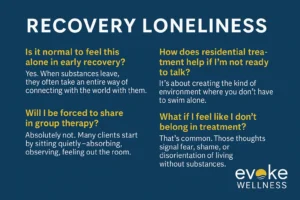Even after detox, the loneliness can feel louder than the cravings. You might be sober—but not okay. And in that fragile space, the idea of opening up to strangers in treatment can feel completely out of reach. What if they don’t get you? What if they expect too much too soon?
At Evoke Wellness in San Marcos, Texas, we understand that early recovery isn’t just about stopping. It’s about starting to feel again—slowly, cautiously, and sometimes with deep reluctance. If trusting others feels impossible right now, we want you to know: you are still welcome here.
Is it normal to feel this alone in early recovery?
Yes. And not just normal—painfully common. When substances leave, they often take an entire way of connecting with the world with them. Whether you drank to loosen up or used to numb out, those patterns filled a space. Now that space feels cavernous.
Early sobriety can feel like walking through your life with no protective armor. Things hit harder. You’re more aware of the quiet, the awkwardness, the ache of wanting someone to see you but not knowing how to let them. Even in group settings, it can feel like you’re the only one still standing on the outside.
But here’s the truth: you’re not alone in feeling alone.
Many people in residential treatment arrive feeling emotionally raw and unsure how to connect. And the very act of saying, “I don’t know how to do this,” is often the first real step toward healing.
How does residential treatment help if I’m not ready to talk?
Residential treatment isn’t about diving into the deep end on day one. It’s about creating the kind of environment where you don’t have to swim alone.
You don’t have to show up ready to share your story. You don’t have to be brave, open, or emotionally fluent. You just have to be present.
At Evoke Wellness TX, we center our care around gentle structure. Meals at the same time every day. Walks you can opt into. Group sessions where listening is just as valid as speaking. Staff members who don’t expect you to bare your soul on command.
Over time, this steady rhythm can work like emotional physical therapy. You start to rebuild the muscles of routine, eye contact, casual conversation. Safety grows not through big moments, but through small, repeated signals: You’re seen. You’re allowed to be quiet. You don’t have to prove anything.
And sometimes, those quiet moments become the foundation of real connection.
What if I’ve been hurt by people before?
It’s not unusual to enter treatment with a long list of people who’ve let you down—friends who disappeared, family who judged, partners who didn’t stay.
When that’s your history, trust feels like a setup. Like something dangerous wearing a kind face.
Residential treatment doesn’t erase betrayal. But it offers something different: consistent presence.
Our clinical and support teams don’t just offer care. They model what it looks like to stay. To witness without pushing. To create space without expectation. You’re allowed to be skeptical. You’re allowed to wait and see.
We’ve had clients tell us:
“I watched people for weeks before I said more than five words in a group. I needed to know they were real. That they weren’t pretending to care.”
– Residential Client, 2024
That need for proof? It makes sense. You deserve safety that’s earned, not assumed.
Will I be forced to share in group therapy?
Absolutely not. You will never be forced to speak, cry, or disclose anything before you’re ready. Your pace is your own.
Group therapy at Evoke Wellness in San Marcos is an invitation, not an obligation. Many clients start by sitting quietly—absorbing, observing, feeling out the room.
And when it’s time to speak, they know they won’t be rushed. We don’t interrupt silence here. We respect it.
One of the most common things we hear from alumni is:
“No one made me talk—but when I finally did, I felt ready. And I knew I’d be heard.”
Sometimes healing begins with just listening. And that’s a powerful start.
What does a typical day in residential treatment look like?
Structure is one of the most quietly healing aspects of residential care—especially when your internal world feels chaotic.
At Evoke Wellness TX, days are designed with gentle rhythm:
- Morning check-in: A soft start with coffee, light movement, or mindfulness
- Mid-morning group: Therapeutic sessions focused on building emotional tools and connection
- Afternoon: Individual therapy, creative or movement-based activities, journaling, or quiet rest time
- Evenings: Peer support meetings, reflection groups, or optional recovery-oriented activities
There’s no pressure to perform. Just a safe container to exist, feel, reflect—and, eventually, trust.
The day flows like a soft current—guiding you gently back into yourself, and then outward toward others when you’re ready.
What if I feel like I don’t belong in treatment?
Feeling like the “wrong kind” of person to be in treatment is incredibly common—especially when trust feels out of reach.
You might think:
- “Everyone else seems so connected.”
- “I haven’t hit rock bottom. Do I really need this?”
- “What if I’m just wasting everyone’s time?”
These thoughts aren’t proof that you don’t belong. They’re symptoms of early recovery. They often signal fear, shame, or the simple disorientation of living without substances.
Here’s what we’ve learned: belonging doesn’t come from matching others. It comes from being accepted in your realest state. Even if that state is closed-off, numb, or skeptical.
In our San Marcos residential treatment center, you don’t have to mold yourself to fit. We make space for exactly who you are, exactly as you arrive.
Can trust really grow if I’ve never had it before?
It can. Not instantly. Not magically. But steadily, quietly, in ways that might surprise you.
You might find it in a late-night conversation with a peer who shares something you’ve never dared to say out loud.
You might find it in the steadiness of a therapist who keeps showing up, even when you push back.
You might find it in the comfort of shared silence during a group walk or a moment of eye contact that says, “I get it.”
Trust isn’t a switch. It’s a garden. And it grows in good soil—with time, light, and consistency.
Residential treatment is one of the few places designed to offer that kind of soil.
How is trust handled differently at Evoke Wellness TX?
We know that trust can’t be rushed, and we don’t treat it like a checkbox. That’s why our care team in San Marcos is trained to meet each client where they are emotionally—not where they’re “supposed” to be.
That looks like:
- Letting you take space without reading it as resistance
- Checking in without demanding explanation
- Welcoming you back even after hard days or missed sessions
- Validating your caution as part of your strength—not a flaw
We don’t need you to be ready to trust everyone. We just want you to feel safe enough to stay in the room.
What happens after residential treatment?
If trust starts to take root here, you don’t have to lose it once you leave.
Our continuum of care includes outpatient support and alumni programming that allows you to stay connected in ways that feel right for you.
Many of our clients continue group therapy, peer support meetings, or one-on-one sessions with trusted providers after residential treatment ends. We help build a bridge so you don’t have to go from 24/7 support to sudden silence.
Because trust doesn’t end with discharge. It deepens with consistency.
You’re allowed to be slow. You’re allowed to be scared. We’ll meet you there.
If the thought of trusting others feels terrifying, that doesn’t disqualify you from healing—it actually makes you a perfect candidate for this kind of care.
At Evoke Wellness in San Marcos, Texas, we understand the ache of early recovery. Our residential treatment program is designed to hold you gently through the loneliness, the silence, the waiting—for as long as it takes.
Call (888) 450-2285 or visit Residential Treatment services page to learn more about how we support people learning to trust again—starting with themselves.



